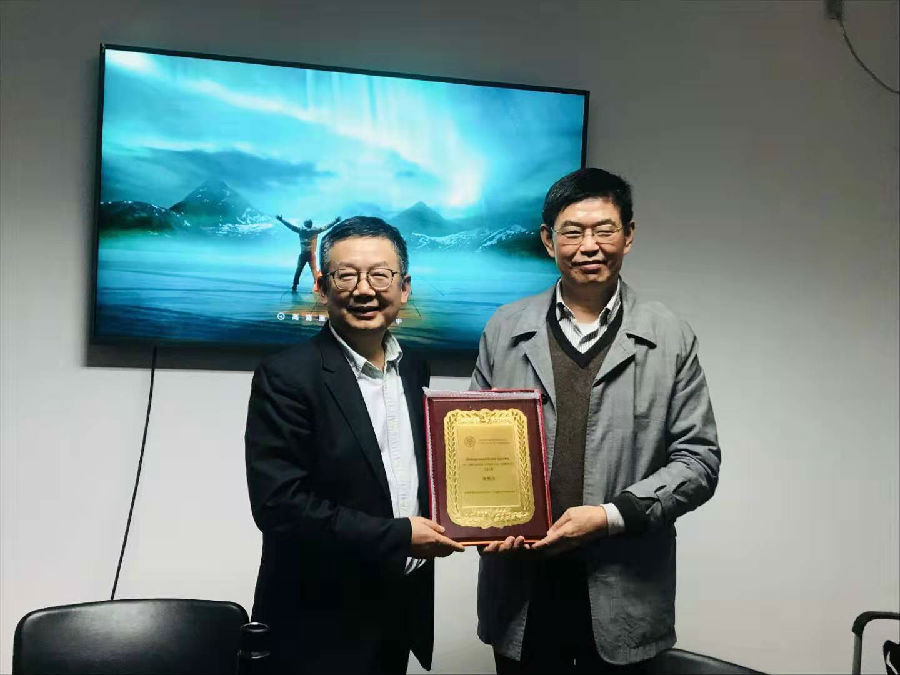Professor Guo Xibao from Wuhan University visited the 88th Chen Daisun Theoretical Economics Seminar organized by the School of Social Sciences, Tsinghua University on the afternoon of November 14, 2019. Professor Guo gave a lecture entitled “Development Economics: Western Academic Frontiers and Theoretical Construction of Chinese Characteristics”. Professor Long Denggao, Yangtse River Scholar, hosted the event and presented a Certificate of Lecture to Mr. Guo.

Mr. Guo first introduced the connotation and evolution of development economics. He pointed out that development economics was born after the end of World War II. Western scholars used traditional and contemporary bourgeois economic theory systems and frameworks to analyze economic growth and economic development in developing countries. It followed a boom in the 1950s and 1960s, the depression of the 1970s, and the renewed prosperity of the 21st century, especially with the announcement of 2019 Nobel Laureates in Economics, three of which were from development economics.
During the academic review process, Mr. Guo emphasized the new trend of development economics in research tools and subject creativity: the analysis objects and research problems of contemporary development economics are increasingly microscopic and fragmented; efforts to introduce institutional, cultural and political economics analysis and interpretation elements into the analytical framework of development economics; the impact of the globalization trend on the focus of development economics research; the introduction of the double blind trial method in comparison with the econometrics and natural science random variable control in the process of development policy performance evaluation. Taking the evaluation of the latest Nobel Laureates in China and abroad academic circles as the breakthrough point, Mr. Guo introduced the role played by Randomized Controlled Trial (RCT) in promoting development economics from deductive to analytical, from theoretical sources to social policy practice. Mr. Guo also introduced the academic doubts and criticisms caused by RCT methods, including revealing the intervention of the development policy on the implementation mechanism, whether the experimental results are applicable to different application environments, inherent defects of general equilibrium effects that are difficult to solve through trials, and whether the controlled control group's interests are damaged or potentially damaged during the trial will cause ethical problems.
Professor Guo believes that Controlled Trial Method lacks theoretical analysis, and its research conclusions are not consistent in different environments or different time points and time periods of the same environment, and the non-fixed late indirect effect brought by trail is often not valued. The losses suffered by the control group during the trial and their compensation also need to be further discussed. Despite this, the Controlled Trial Method is still a new and effective tool. But in the process of using this tool, we should not forget that the essential characteristics of development economics are its macroscopic, dynamic, structural and comprehensive nature. It is not appropriate to treat and understand development economics as a branch of neoclassical economics. The grand historical narrative framework and key macro-central issues constructed in the early stage of development economics have been improperly marginalized and forgotten.
In view of the current stage of economic development and long-term vision of China, Mr. Guo proposed that we should pay attention to the huge differences between the developing countries and developed countries in the economic development stage and the internal structure of the economy and focus on the urbanization and industrialization of developing countries under the dual economic conditions, solve the problems they encounter in these processes, and make a comprehensive analysis so as to propose targeted recommendations.
At the end of the lecture, Mr. Guo pointed out that China's economy has been growing for decades. The Chinese people, one fifth of the human race, have achieved rapid and extensive industrialization and urbanization. The living standard of the Chinese people has been greatly raised and poverty has been significantly improved. How to explain this success and explore the root cause of China's success is the common task of contemporary Chinese development economists. The neglect of this topic by the international academic community should make us make a difference. China is currently making an increasing contribution to the development of the world economy, and China has also entered the rank of middle-income countries. The main front of development economics in the 21st century should be in China. The research paradigm and discourse power of development are still in western academic circles, but the disconnection between theory and reality needs to be changed. Therefore, we should carefully study the reality of China, the world's largest developing country economy, and try to find out its national characteristics and particularity as a developing economy, a middle-income economy, a major economy, a transitional economy and a socialist market economy. Only on the basis of these five economic characteristics can we seek truth from facts and truly build the development economics with Chinese characteristics that belongs to China itself and has native features.
And Development Economics, the key textbook edited by Mr. Guo, after being reviewed by the National Textbook Committee and other departments and after an eight-year journey from its initiation in 2011 to its publication in 2019, was officially published by the Higher Education Press this August.